17-18 April 2010 – Pope Benedict XVI visited Malta to much fanfare in April 2010. In his two-day visit, he visited St Paul’s Grotto in Rabat and celebrated mass on the Granaries in Floriana. His visit was the third pontifical visit that Malta has received, after Pope John Paul II visited the islands in 1990 and 2001.
10 October 2010 – The first office block in the much vaunted Smart City project was officially opened. The project, worth some €275 million, was unveiled three years prior by Prime Minister Lawrence Gonzi.
21 February 2011 – Two Libyan Air Force Mirage jet fighters unexpectedly fly into Malta, with their pilots defecting from Libya after they were ordered to bomb protestors who had taken over the city of Benghazi. Gonzi refused to return the jets to Libya unless their strongman leader Muammar Gaddafi released three Dutch soldiers. The two pilots returned to Libya to a hero’s welcome the following September after Gaddafi’s regime had been overthrown. The jets were eventually returned to Libya the following January.
28 May 2011 – Malta votes in favour of introducing divorce in a referendum which divided the country being won by the pro-divorce side by 14,576 votes. Prime Minister Gonzi gave his MPs a free vote on the bill which was tabled in Parliament. 52 MPs voted in favour of it, 11 – including Gonzi himself – voted against it, while a further five abstained. The law introducing divorce officially came into force on 1 October 2011.
3 July 2011 – Malta’s famous yellow and red buses were taken out of service, and replaced by a new modern fleet run by Arriva. The move proved to be a disaster with delays and staff disputes characterising the first months under the new operator. Transport Minister Austin Gatt only narrowly survived a vote of confidence, with Speaker Michael Frendo’s casting vote saving the embattled minister. Arriva lasted till 1 January 2014 having run up €50 million in debts, and was taken over by Malta Public Transport.
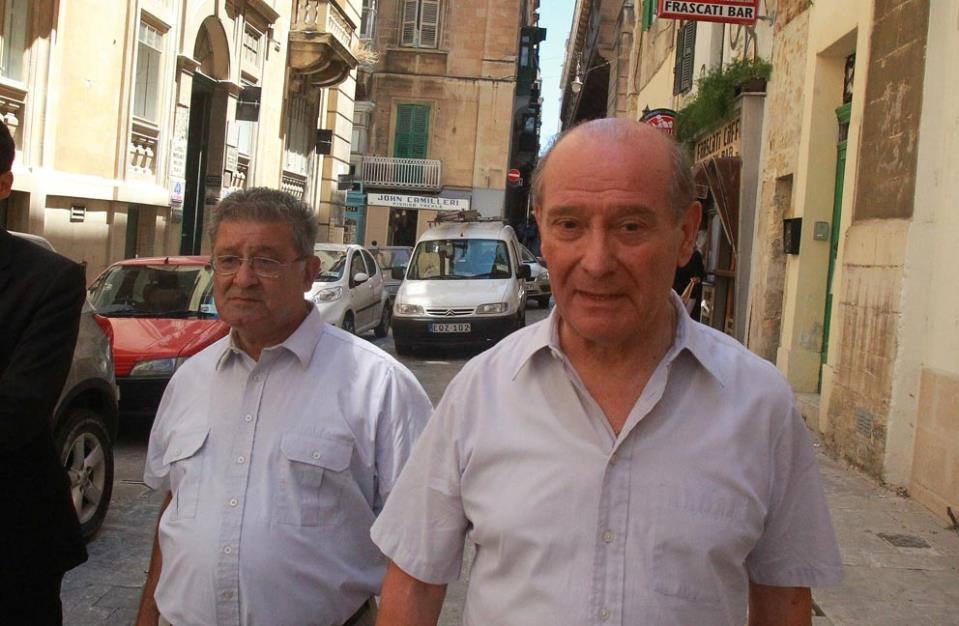
2 August 2011 – Two priests, Carmelo Pulis and Godwin Scerri, were sentenced to six and five years of imprisonment respectively after being found guilty of sexually abusing a total of 11 minors under their care at the St Joseph Home in Hamrun. They were de-frocked and their sentences were confirmed by an Appeals Court a year and a half later. Archbishop Paul Cremona apologised to the victims, and the Church offered psychological assistance to the victims but stopped short of offering financial compensation.
26 January 2012 – The Speaker’s casting vote once again comes to the PN’s rescue as a vote of no confidence ends in a tie after PN MP Franco Debono’s abstention. Debono had threatened to withdraw his support if Prime Minister Gonzi did not split the Justice and Home Affairs Ministry. Gonzi reshuffled his Cabinet, but this did not appease Debono who vowed that he will vote against the government in a vote of confidence if it is tabled. The Labour Party, in Opposition, obliged and tabled a vote of confidence, only for Debono to abstain and for the government to survive by the skin of its teeth.
30 May 2012 – Debono voted in favour of an Opposition motion of confidence in Home Affairs minister Carm Mifsud Bonnici, leading to Mifsud Bonnici’s resignation. Gonzi called a confidence vote, this time in the government, which Debono voted in favour, allowing the administration to continue.
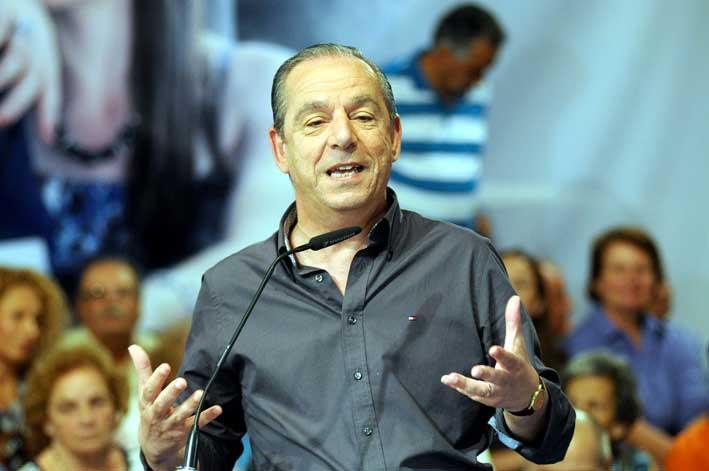
19 June 2012 – The respite for Gonzi is short-lived after he was forced to accept the resignation of Malta’s ambassador to the EU Richard Cachia Caruana. The unexpected development came after PN MPs Jeffrey Pullicino Orlando and Jesmond Mugliett voted in favour and abstained respectively on an Opposition motion. Pullicino Orlando resigned from the party soon after, and stood for election in the name of the Labour Party years later.
16 October 2012 – EU Commissioner John Dalli resigns under a cloud of scandal after the European Anti-fraud Office (OLAF) reported on accusations that an associate of Dalli had asked for €60 million from Swedish Match, the main producer of Swedish snus, in return for Dalli's help in changing European tobacco regulations. Dalli continues to deny wrongdoing to this day.
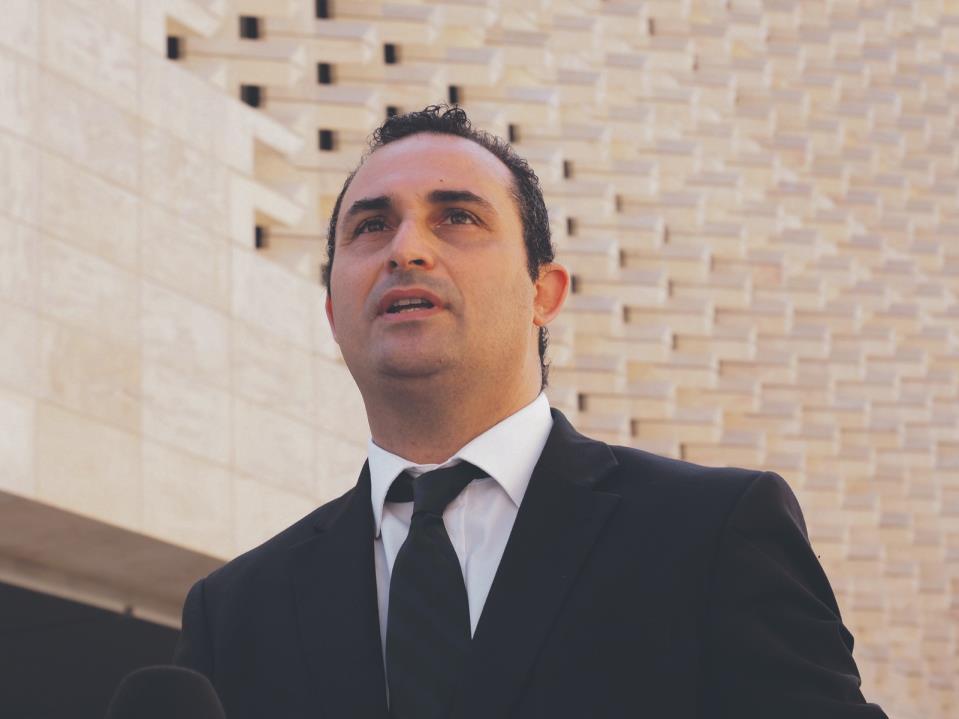
10 December 2012 – Franco Debono votes against his government after the Budget for the forthcoming year is announced, resulting in the government’s collapse. Prime Minister Gonzi calls an election for 9 March of the following year.
20 February 2013 – Former Enemalta Chairman Tancred Tabone and his one-time advisor Frank Sammut are charged in connection with an oil procurement scandal which would rock the country and result in a further five arraignments. Oil trader George Farrugia would later be granted a presidential pardon in exchange for information, but no convictions in connection with the scandal have been made so far.
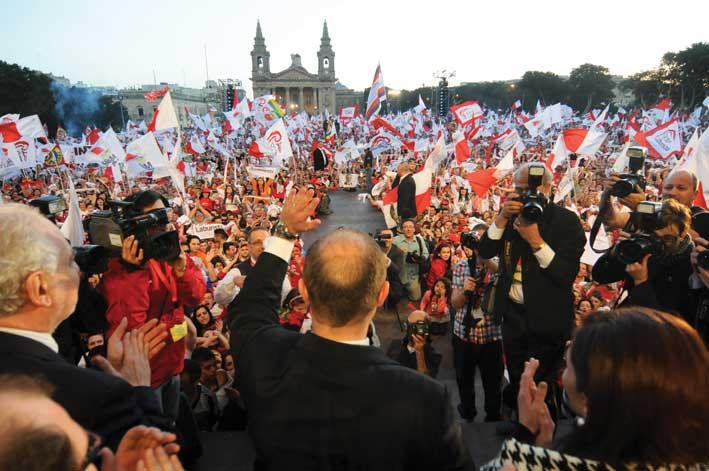
9 March 2013 – The Labour Party led by Joseph Muscat registers a landslide win in the general election, meaning that the party returns to government for the first time since 1998. Amongst Muscat’s key pledges are a no tolerance approach to corruption and a new power station leading to cheaper electricity bills among others. Lawrence Gonzi announces his intention to step down from the post of PN leader.
4 May 2013 – Simon Busuttil takes over from Lawrence Gonzi as PN leader after beating Mario De Marco, Francis Zammit Dimech and Raymond Bugeja in a leadership election. He eventually got elected with a 93% vote of confidence after De Marco withdrew from the second round of voting.
13 October 2013 - Consortium Electrogas Malta is chosen by Enemalta to build a new gas power station and supply electricity to the corporation. Electrogas is made up of German giants Siemens, Azerbaijan state-owned Socar, UK firm Gasoil, and Maltese consortium GEM Holdings, owned by Mark Gasan, Paul Apap Bologna and Yorgen Fenech. Gasoil would later pull out due to financial difficulties, and the project would become singularly one of the most controversial subjects of the decade.
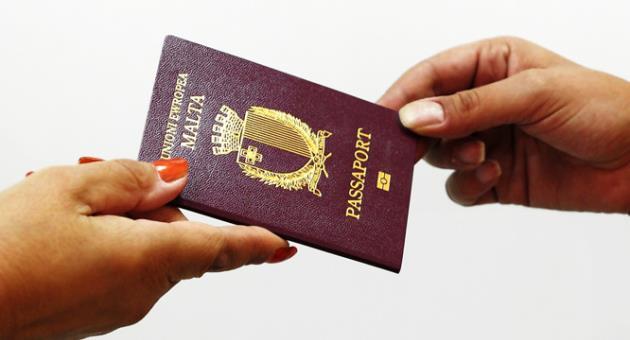
18 February 2014 – The European Commission gives the green light to Malta to start its controversial citizenship by investment scheme – called the Individual Investors Programme. This came after MEPs voted overwhelmingly against the scheme a month prior. The scheme proved to be controversial not least because several people who bought Maltese citizenship were later charged with wrongdoing overseas.
4 March 2014 – Controversy surrounds the government after it emerges that it had paid an enormous €4.2 million to acquire the iconic Cafe Premier in Valletta. It was reported how the Lands Department had paid off arrears for Café Premier on income tax, VAT, energy bills and a bank loan to get in possession of the building in question. The National Audit Office later found that there was insufficient justification for the government’s decision not to pursue legal action in a bad to rescind the cafe premier lease. The building was, some years later, handed over to the Valletta local council.
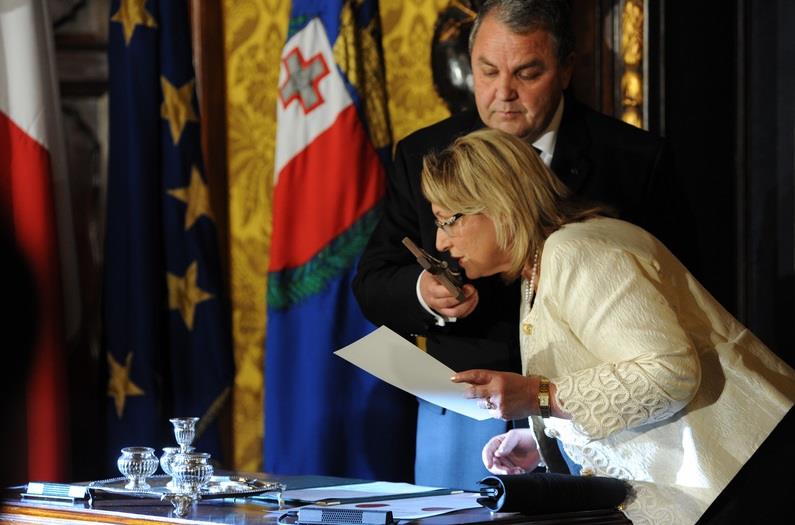
4 April 2014 – Marie-Louise Coleiro Preca is sworn in as the 9th President of Malta, becoming only the second female President since Agatha Barbara held the post between 1982 and 1987.
14 April 2014 – The Civil Unions Act, establishing civil unions for both same-sex and opposite-sex couples with the same rights as those available to married couples, is approved in Parliament, with all Labour MPs voting in favour and all Nationalist Party MPs abstaining. It was signed by the President two days later and published in the Government Gazette the following day. The first civil union took place on 13 June 2014.
25 May 2014 – The Labour Party wins the MEP elections in terms of votes, but loses a seat to the PN after Therese Comodini Cachia snatched the last seat away from Labour’s Clint Camilleri by just 206 final count votes.
3 September 2014 – A report following tests carried out on columns in the Accident and Emergency Department shows that “inferior” concrete was used in the building of the hospital. The government would later sue Skanska, the Swedish firm who built the hospital, for their work on the hospital. There is yet to be an outcome on those legal proceedings.

19 November 2014 – The government faces a cover-up scandal after it emerged that the driver of Home Affairs Minister Manuel Mallia, PC Paul Sheehan, had shot at a car driven by an Englishman who had clipped the ministerial vehicle’s wing mirror. The government had initially said that Sheehan had fired warning shots into the air, but two bullet holes in the Englishman’s car confirmed otherwise.
5 December 2014 – Leaked calls emerge showing that Acting Police Commissioner Ray Zammit had instructed the removal of the Englishman’s car before a magisterial inquiry was opened. Sheehan is heard telling Zammit that he had fired two shots at the “hit and run” driver, while Zammit told Government Head of Communications Kurt Farrugia that they had been warning shots, which then morphed into the warning shots fired into the air that were referred to in the statement.
8 December 2014 – Manuel Mallia is sacked by Prime Minister Muscat after he did not heed calls to resign voluntarily. Carmelo Abela takes Mallia’s place as Home Affairs Minister.
8 February 2015 – The Swissleaks scandal rocks the world after the International Consortium of Investigative Journalists (ICIJ) reveal a trove of almost 60,000 leaked files that provide details on over 100,000 HSBC clients and their bank accounts in Switzerland. It is found that $687.4 million in Swiss bank accounts belonged to people with Maltese passports. Former Enemalta chairman Tancred Tabone, former PN Minister Ninu Zammit, and former PN minister Michael Falzon were all found to have Swiss accounts.
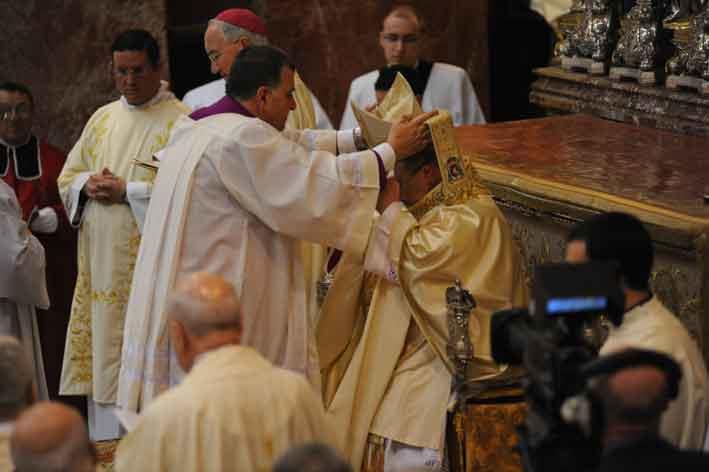
21 March 2015 – Charles J. Scicluna officially replaces Paul Cremona as Archbishop of Malta.
11 April 2015 – A referendum to ban spring hunting in Malta narrowly fails, with the pro-spring hunting faction winning by just 2,220 votes. The spring hunting season was opened three days later, but was later shut after a kestrel was illegally shot and fell into the yard of a secondary school in Birgu. Spring hunting remains a touchy issue, but the season continues to be opened in spite of European scrutiny.
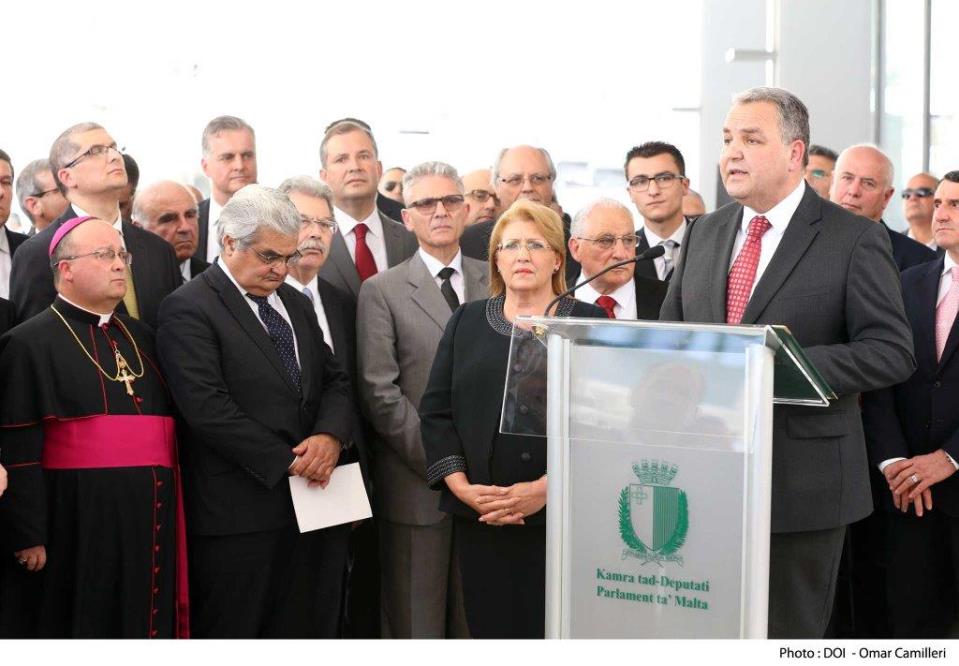
4 May 2015 – The new Parliament, designed by Renzo Piano, is finally opened and hosts its first sitting, three years after its initially slated date of completion. The building of the new Parliament was part of the City Gate Project, and while its design divided opinions and while it still experiences teething problems such as water leakages, it is now one of Valletta’s landmarks.
31 May 2015 – It emerges that businessman Mark Gaffarena made a profit of €685,000 in just two months after buying part of a property on Old Mint Street in Valletta knowing full well that the government intended to expropriate it. Gaffarena bought the area on February 26 for €139,762, while the government expropriated it on April 10 for €822,500 in land and cash.
27 June 2015 – Health Minister Konrad Mizzi announces that Vitals Global Healthcare have been chosen as the company to provide a 30-year services concession for the redevelopment, maintenance, management and operation of St. Luke’s Hospital, Karin Grech Rehabilitation Hospital and Gozo General Hospital, a project which would cost north of €200 million.
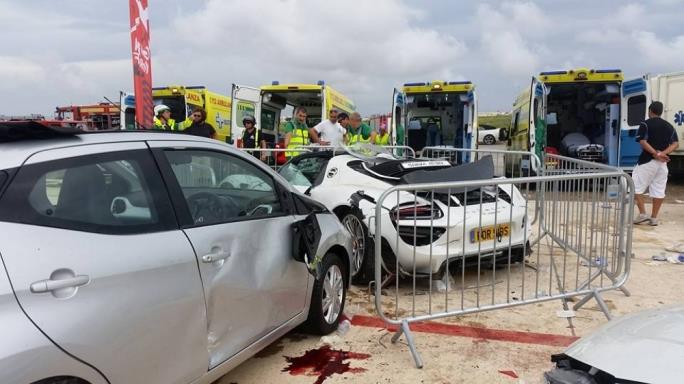
4 October 2015 – 26 people are injured, five of which critically, after a Porsche 918 supercar careens into the crowd at the annual Paqpaqli ghall-Istrina charity event. The Porsche’s owner and driver Paul Bailey and some of the event organisers were later charged in relation to the accident. Paqpaqli ghall-Istrina has not been held since.
27 November 2015 – The 24th Commonwealth Heads of Government Meeting was held in Malta with the attendance of Queen Elizabeth II – her first visit since 2007 – and 31 heads of state including British Prime Minister David Cameron, Australian Prime Minister Malcolm Turnbull, and Canadian Prime Minister Justin Trudeau. The meeting focused on climate change, terrorism and security issues – this being held in the aftermath of the Paris attacks, economic and trade issues, and corruption were also on the agenda.
20 January 2016 – Parliamentary Secretary for Planning Michael Falzon resigns after the Auditor General’s damning report into the Gaffarena property expropriation, which concluded that Falzon and other officials had failed to safeguard the government’s interests in the deal. Deborah Schembri is appointed as his replacement.
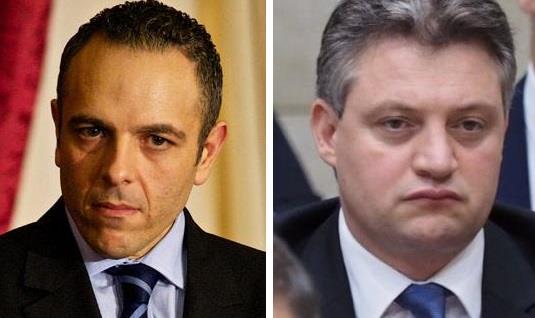
3 April 2016 – In what is the biggest data leak in modern journalism, the Panama Papers rocked the world scene. It also rocked Maltese politics after it emerged that Health Minister Konrad Mizzi and the Prime Minister’s Chief of Staff Keith Schembri both owned a company in Panama. The companies were called Hearnville and Tillgate respectively, and they were set up by Nexia BT along with another company, called Egrant, the owner of which was unknown. Both Mizzi and Schembri came under pressure to resign, but neither did: Mizzi lost his ministerial portfolio but survived a confidence vote after the government benches voted unanimously in his favour and the Prime Minister defended his chief of staff.
16 September 2016 – The American University of Malta is officially established after being initially announced in May 2015. Dock 1 in Cospiqua is earmarked as the site for the University’s main campus, while, to much controversy, a site in Zonqor, Marsascala, is also earmarked. The University aimed to have an intake of 1,000 students in its first year, but only managed to attract 23. The University currently has 143 students enrolled – far short of the 710 target it had promised the Maltese government.

23 December 2016 – Dramatic scenes intervene with the island’s Christmas preparations as a hijacked Afriqiyah Airways Airbus A320 carrying 118 people lands at the Malta International Airport. The plane had been hijacked mid-way through a Libyan domestic flight by two hijackers seemingly motivated by the country’s political tensions. All passengers and crew emerged safely and were flown back to Libya the day after, while two hijackers were arraigned on Christmas Day. One hijacker was granted bail in February 2019, and the case is yet to be concluded.
1 January 2017 – Malta takes the rotating EU Presidency for the first time in its history. The six-month period saw a number of European achievements such as the end of roaming charges, the EU joining the Istanbul Convention on preventing and combating violence against women, and several other dossiers.
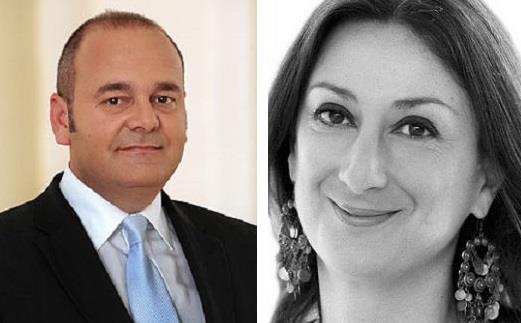
30 January 2017 – Another scandal, this time titled Brothelgate, breaks after Daphne Caruana Galizia reports that Economy Minister Chris Cardona had been spotted at a brothel called FKK Acapulco in Germany. Cardona was in Germany on government business at the time. The Economy Minister vehemently denied the allegations, suing Caruana Galizia and having her bank accounts frozen as a result. The libel cases were later dropped, but a court recently ordered that phone data which could indicate Cardona’s whereabouts on the night in question are preserved.
8 March 2017 – The world-famous Azure Window in Dwejra, Gozo, collapses as the island is battered by a savage storm. The arch had appeared in a number of famous films and productions, including hit-series Game of Thrones. The government had launched a call for proposals for the area, and a proposal for a new steel arch submitted by a Russian architect had captured the imagination of a fair few people. The government however announced that it would not proceed with the proposal.
20 April 2017 – Daphne Caruana Galizia publishes the bombshell allegation that the Panama company Egrant – set up in the same period as those of Keith Schembri and Konrad Mizzi – is owned by the Prime Minister’s wife Michelle Muscat. Joseph Muscat and his wife vehemently deny the story, calling it the biggest political lie in the country’s history, and 11 days later, amid calls for his resignation, the Prime Minister calls an early general election.
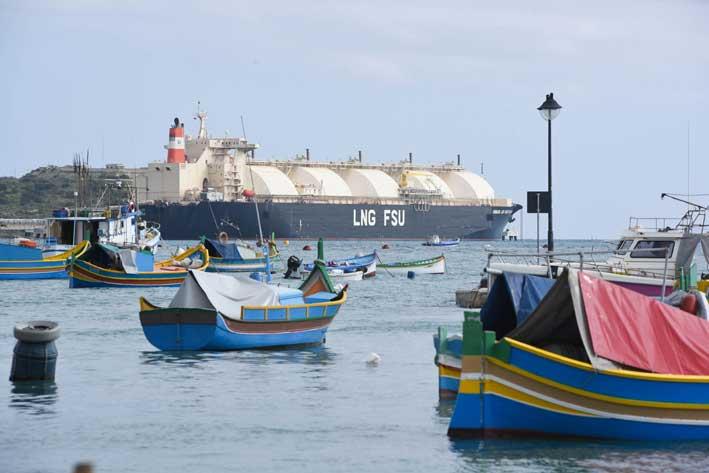
24 April 2017 – The Electrogas power station is finally inaugurated and switched on for the first time by the Prime Minister in the presence of Konrad Mizzi – at that point, still Minister without a portfolio.
3 June 2017 – Muscat’s Labour Party romp to another commanding electoral victory, beating the Forza Nazzjonali coalition by over 36,000 votes – effectively retaining its 2013 majority. PN Leader Simon Busuttil announces that he will step down following the defeat.
12 July 2017 – Parliament approves a bill legalising same-sex marriage, with 66 out of 67 MPs voting in favour of it. The PN’s Edwin Vassallo was the only one to vote against. The law was officially enacted on 1 September that year.
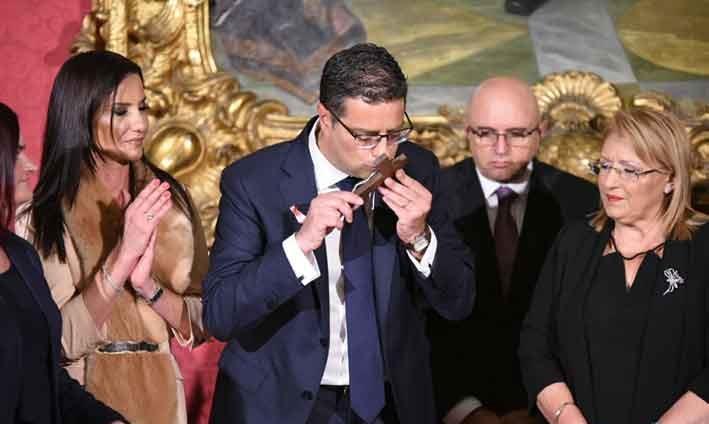
17 September 2017 – Adrian Delia, initially considered an outsider, defeats Chris Said, Alex Perici Calascione and Frank Portelli to become the new PN leader, replacing Simon Busuttil.
16 October 2017 – The island is shocked after journalist Daphne Caruana Galizia is assassinated in a car bomb detonated outside her home in Bidnija. The Prime Minister promises that no stone will be left unturned in the investigations.
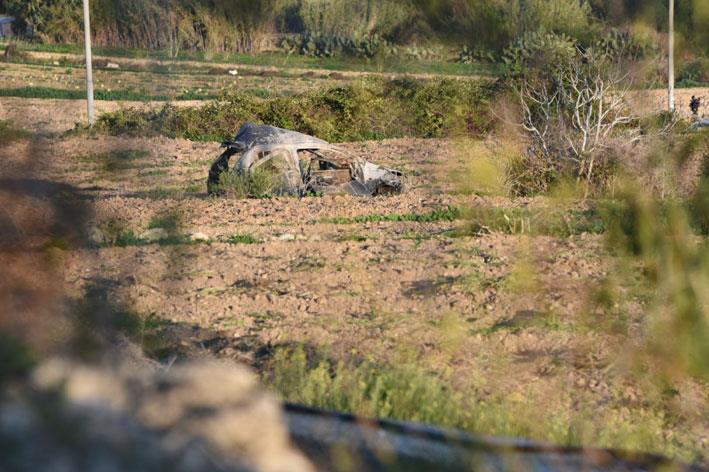
4 December 2017 – Ten people are arrested in connection with the investigations into Daphne Caruana Galizia’s murder following a day of raids. The day after, three – brothers Alfred and George Degiorgio, and Vincent Muscat – are accused of carrying out the murder. They would be formally charged in July 2019.
20 February 2018 – Vitals Global Healthcare’s supposed 30-year concession for the operation of three hospitals in Malta and Gozo ends after just 22 months, with VGH selling the concession to Steward Healthcare. The sale happened amidst reports that VGH was facing financial difficulties despite having received €50 million from the government in two years. A court has since ruled that three ministers – Konrad Mizzi, Edward Scicluna, and Chris Cardona – will face a magisterial inquiry over the privatisation deal after a magistrate found that there was sufficient evidence for an inquiry to be opened.

27 June 2018 – The MV Lifeline arrives in Malta with 234 migrants onboard after a tense international stand-off between Malta and Italy. The migrants were redistributed across eight European Union member states. The captain Claus Peter Reisch was later charged with entering Maltese waters on an unlicensed vessel. He was eventually fined €10,000. The event signalled the start of a renewed migratory crisis which saw a number of stand-offs between Malta and Italy involving NGO rescue vessels.
22 July 2018 – The Attorney General publishes 49 pages of the conclusions of the Egrant inquiry which state that there is no evidence that Egrant belonged to Joseph or Michelle Muscat and that certain key documents had been falsified. A tearful Prime Minister Muscat calls a press conference and speaks of how the Egrant saga had been proven as the biggest lie in political history. PN Leader Adrian Delia meanwhile calls on former leader and then MP Simon Busuttil to suspend himself, a decision which ultimately divides the party and leads to a number of MPs backing Busuttil over their leader.
9 November 2018 – Yorgen Fenech – CEO of Tumas Group and shareholder in the Electrogas consortium – is named as the owner of a Dubai-based company called 17 Black. 17 Black was marked as the “target client” for the Panama companies Tillgate and Hearnville, belonging to Keith Schembri and Konrad Mizzi respectively, along with another company called Macbridge. Fenech never denied the story, while Schembri and Mizzi again resist calls to step down.
5 November 2018 – Pilatus Bank, the bank embroiled in the Egrant scandal, is officially shut down by the European Central Bank – two years after it was first embroiled in alleged money laundering breaches.
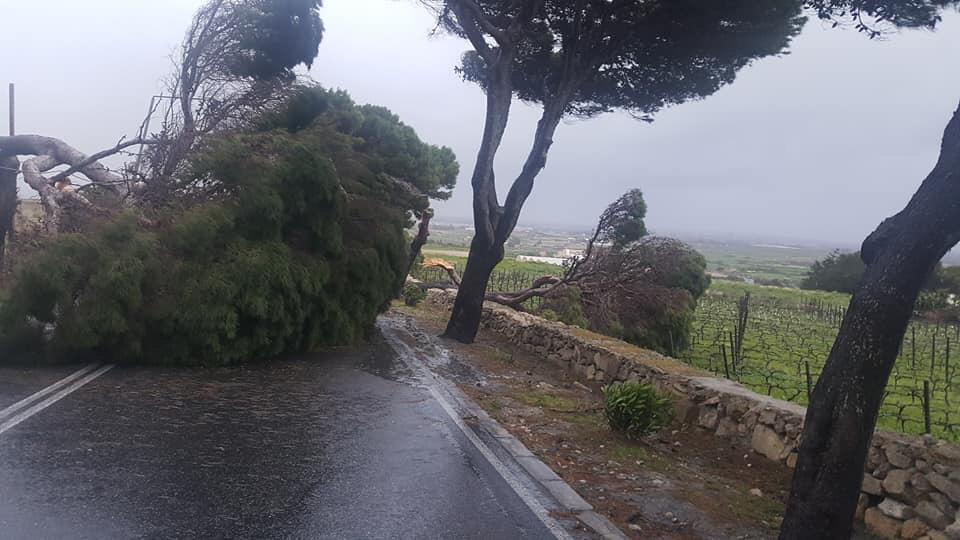
23-24 February 2019 – Malta is battered by a record storm, with winds reaching hurricane levels and with damage being done across the island. The storm brought dramatic scenes as fish were thrown out of the water in Xemxija and carnival enthusiasts were left helpless as their floats were damaged in Marsa. It was later calculated that the storm caused around €25 million in damage.
28 March 2019 – The Libyan tanker El Hiblu 1 is stormed by Maltese Armed Forces after it was taken over by migrants whom it had rescued. The tanker was brought to Malta, where three suspected ring leaders – all of whom are teenagers, and two of whom are minors – were taken to court and charged with an act of terrorism. The trio have since been released on bail.

5 April 2019 – George Vella becomes the 10th President of Malta, replacing Marie-Louise Coleiro Preca.
8 April 2019 – Malta is shocked after Ivorian Lassana Cisse is murdered in a drive-by shooting in Birzebbuga. Two others are also shot, but survive the ordeal. Two soldiers, Lorin Scicluna and Francesco Fenech were arrested on 19 May and charged with the murder, which was believed to be racially motivated. They both pleaded not guilty and have since been granted bail.
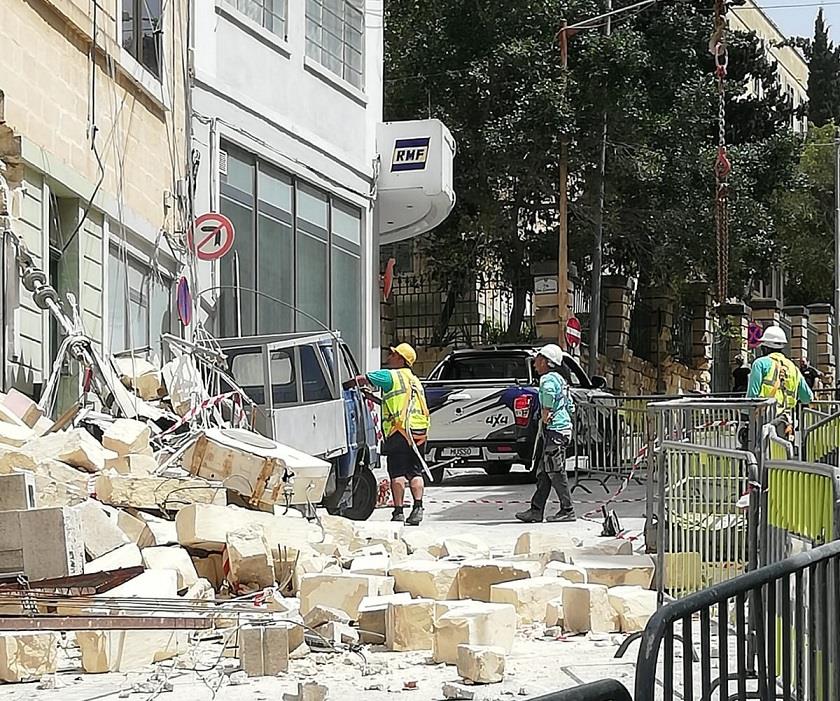
26 April 2019 – All residents manage to escape an apartment block moments before part of it collapses late at night in Guardamangia. It is the first of three building collapses, with the latter two coming within a week of each other. The common factor between the buildings is that they were adjacent to construction sites. After the third collapse and amidst protests by civil sociey, Prime Minister Muscat immediately suspends all excavation and demolition works until new laws are drawn up.
25 May 2019 – The Labour Party cruise to a crushing electoral victory in the MEP and the local council elections with an historic majority over the Nationalist Party. The 42,656 vote majority for Muscat’s party in the MEP election sees Labour win back a fourth seat at the European Parliament, while the defeat piles further pressure upon already embattled PN leader Adrian Delia.

19 June 2019 – In a bombshell decision, a court cancels the permit for db Group’s massive 38-storey City Centre project, noting that one of the Planning Authority’s board members, Matthew Pace, had a conflict of interest in the project. The decision is hailed by many as a victory for activists and civil society, who had appealed the initial approval of the application.
28 July 2019 – After two months of internal unrest, Adrian Delia survives a confidence vote within the party with a less than convincing score of 67.75%. He pledges to continue to reform the party so that it can take the fight to the Labour Party at the next general election.
20 September 2019 – Prime Minister Muscat finally sets up a public inquiry into the murder of Daphne Caruana Galizia. Judge Emeritus Michael Mallia was appointed to chair it, while being joined by former Dean of the Faculty of Law, constitutional expert Ian Refalo and forensic expert Anthony Abela Medici. The latter two were later replaced by Chief Justice Emeritus Joseph Said Pullicino and Judge Abigail Lofaro.
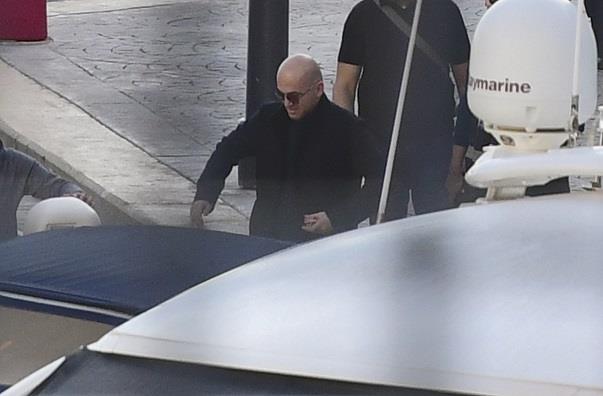
20 November 2019 – Only a day after it emerges that an alleged middleman in the Daphne Caruana Galizia assassination has been offered a presidential pardon if his information stands in court, Yorgen Fenech is arrested by Armed Forces as he was leaving Portomaso Marina on his yacht. It is the first day of what would be an incredible political crisis that ended up throwing Malta’s name into the international spotlight.
26 November 2019 – In a surreal day, both the Prime Minister’s Chief of Staff Keith Schembri and Tourism Minister Konrad Mizzi resign. Schembri is arrested on that same day in connection with the murder. Economy Minister Chris Cardona meanwhile suspends himself after he too was questioned in connection with the murder some days prior.

28-29 November 2019 – Prime Minister Muscat emerges from a marathon cabinet meeting at 3:30am and announces that Yorgen Fenech’s request for a presidential pardon in exchange for information which would implicate Keith Schembri in the Caruana Galizia assassination had been refused. On the same day, it emerges that Schembri had been released from police custody.
30 November 2019 – Yorgen Fenech is formally charged with complicity in the Caruana Galizia murder. He pleads not guilty. Several details continue to emerge from the case, including that the assassination cost €150,000, that the middleman Melvin Theuma was given a phantom job with the government, and that Keith Schembri remains under investigation in connection with the case.
1 December 2019 – Amid mounting pressure locally and internationally, Prime Minister Muscat announces that he will step down from his post in January of the New Year when a new leader for the party will be elected. Protests however continue, with the Opposition, civil society members, constituted bodies, and even the European Parliament calling on Muscat to step down immediately.